|
|
|
Sort Order |
|
|
|
Items / Page
|
|
|
|
|
|
|
| Srl | Item |
| 1 |
ID:
189831
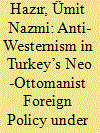

|
|
|
|
|
| Summary/Abstract |
After 2013, Turkey’s foreign policy has been noted for neo-Ottomanist
rhetoric and anti-Western discourse, which resulted in the deterioration
of relations with the West. To disclose the patterns of anti-Westernism
in Turkish foreign policy, this paper analyzes official speeches of Turkish
President Recep Tayyip Erdoğan given at international meetings and
events from 2014 to 2021. Based on critical constructivism, which
underlines the co-constitutive relationship between identity and
foreign policy, and the role of the Other in identity construction,
this article demonstrates how the Western Other has been used by
Erdoğan in building Turkish Ottoman identity. This article articulates
the anti-Western notion of neo-Ottomanism and argues that Erdoğan’s
anti-Western discourse bears the Islamic undertone and relies on the
delineation of the Turkish-Ottoman Self from the Western Self.
|
|
|
|
|
|
|
|
|
|
|
|
|
|
|
|
| 2 |
ID:
189824


|
|
|
|
|
| Summary/Abstract |
W
hat is the role of diplomacy in the crucial moments of
international politics? As a rule, diplomacy gives way to
the individual ability of leaders to objectively assess the
balance of power and make decisions on the basis of such assessments.
Filled with nostalgia, we look at the 19th century or the second half of
the Cold War era as the triumph of diplomatic art. But this was nothing
more than the result of the greatest stability ever in relations between
the key powers, which rested on the order recognized by all. But the
foundation of this order began to crumble due to the evolution of its
constituent living organisms—states, and then even the most advanced
diplomatic skills faced insurmountable difficulties.
|
|
|
|
|
|
|
|
|
|
|
|
|
|
|
|
| 3 |
ID:
189829
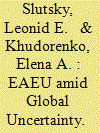

|
|
|
|
|
| Summary/Abstract |
The article analyzes the development of the Eurasian Economic Union
(EAEU) before, during and after the COVID-19 pandemic through the
lens of the so-called integration dilemma, when one state perceives its
neighbors’ integration into an economic alliance as a threat to its own
security or prosperity. The authors consider the processes of interstate and
supranational adaptation, as well as the adaptation of the basic model of
integration to the existing practices of interaction as part of the project to
ensure four freedoms. The institutional inertia characteristic of the EAEU
and the manifest desire primarily to prevent development risks are caused by the “hybrid nature” of the integration association, in which interstate ties
and the interests of states often outweigh supranational ones. At the same
time, integration cooperation made it possible for the member states to
somewhat harmonize and coordinate their joint response to the pandemic.
Sweeping anti-Russian sanctions have created new, unprecedented risks
for integration cooperation, but at the same time have opened up certain
opportunities to overcome their consequences.
|
|
|
|
|
|
|
|
|
|
|
|
|
|
|
|
| 4 |
ID:
189825


|
|
|
| 5 |
ID:
189823


|
|
|
|
|
| Summary/Abstract |
By the end of the second decade of the 21st century, the Russian foreign
policy discourse had transformed from hard-headed “sober realism” into
bizarre “values-obsessed realism.” The texts of Russia’s official strategies
now appeal to such aspects of political identity as “spiritual values,”
“cultural (civilizational) code,” “historical truth,” etc. Such appeals,
coupled with almost eschatological rhetoric, are not uncommon in official
speeches of the country’s political leadership. But this shift in political
discourse cannot be explained just by the reaction to the changes in the
international situation after the incorporation of Crimea into Russia.
The author suggests that the reason is a change in the political leader’s
mindset after staying in power for such a long time. As his powers get
extended, almost any political leader begins to think in “historical”
and “global” categories, viewing personnel unchangeability not as
vulnerability, but, on the contrary, as proof of unique “stability” and
“governability.”
|
|
|
|
|
|
|
|
|
|
|
|
|
|
|
|
| 6 |
ID:
189833


|
|
|
| 7 |
ID:
189826


|
|
|
| 8 |
ID:
189832
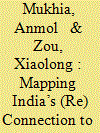

|
|
|
|
|
| Summary/Abstract |
Why does India have a vested interest in Eurasia? How feasibile is non-
Western Eurasia’s future? In this paper, the term ‘Eurasia’ refers to non-
Western Eurasia, that is, excludes the EU. Indian policymakers and scholars
believe that the Eurasian region’s strategic location, culture and civilization
offer great opportunities for the development of energy resources, trade,
and other fields. However, the enormous Eurasian landmass, covering China
in the east to Europe in the west, and the Arctic in the north to India in the
south, embraces various powerful countries that are facing serious security
and strategic challenges. The strategic importance of China’s Belt and Road
Initiative (BRI) intended to build a link to Eurasia pushes India to get more
involved in the Eurasian region.
|
|
|
|
|
|
|
|
|
|
|
|
|
|
|
|
| 9 |
ID:
189828
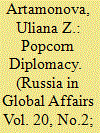

|
|
|
|
|
| Summary/Abstract |
U.S.-Russia tensions have been on the rise for years. This article attempts
to examine them through the lens of the clash between two different world
order paradigms. While Russia advocates multipolarity as the next step away from unipolarity, the U.S. presses for a “rules-based order built after WWII
with the American singular leadership.” The author argues that one of the
most powerful public diplomacy instruments in terms of promoting the
U.S.-centric paradigm of the world order is blockbusters, referred to herein
as “popcorn diplomacy.” The paper offers an insight into how Hollywood
movies are linked with Washington’s narrative of the world order. Using the
method of the popular geopolitics theory and applying content analysis to
several U.S. blockbusters, the author identifies certain techniques that help
advance the American perception of the world and mold public opinion to
the benefit of U.S. national interests. In conclusion, the article examines
the risks and opportunities this policy poses to Russia.
|
|
|
|
|
|
|
|
|
|
|
|
|
|
|
|
| 10 |
ID:
189830


|
|
|
|
|
| Summary/Abstract |
Having exhausted all diplomatic means to stop NATO’s expansion,
Russia launched a special military operation in Ukraine. Leaving
aside anti-Russian propaganda, unbiased experts acknowledge that
its success is unquestionable. However, NATO’s assistance to Ukraine
threatens Russia’s vital security interests, leaving those of the United
States unaffected. This will result in significant changes for Eurasian
integration, both within the EAEU and Greater Eurasian Partnership.
|
|
|
|
|
|
|
|
|
|
|
|
|
|
|
|
| 11 |
ID:
189822


|
|
|
|
|
| Summary/Abstract |
Why do Russian-Ukrainian relations are of great concern to every
Russian and Ukrainian? In some regards, what we are witnessing today is
a delayed civil war which could have happened in the early 1990s
with the collapse of the USSR, when the first leaders of independent
Russia and Ukraine boasted that they had avoided a bloody divorce
like that in Yugoslavia. In Russia, every other citizen has relatives in
neighboring Ukraine, and the current developments are more a matter
of domestic politics. When the Ukrainian government closes Russian
Orthodox churches or bans a pro-Russian opposition political party,
the story gets immediate coverage on Russian state TV channels and
comments from Russian politicians.
|
|
|
|
|
|
|
|
|
|
|
|
|
|
|
|
| 12 |
ID:
189827


|
|
|
|
|
| Summary/Abstract |
The article analyzes the QAnon phenomenon and the anti-vaxxer movement
of COVID-19 deniers1 as typological manifestations of conspiratorial
“alternative rationality.” A number of hypotheses have been proposed:
during a pandemic and a parallel infodemic, conspiracy thinking quickly
becomes transboundary; all conspiracy theories share certain features; they
are discursive (according to Foucault) and underlain by the question of
power; growing public distrust of the government is one of the fundamental reasons for the popularity of conspiracy theories. The article proves that
the transboundary nature of information contributes to the global spread
of conspiracy theories, but they cannot be universalized because they have
local specifics in each country (region).
|
|
|
|
|
|
|
|
|
|
|
|
|
|
|
|
| 13 |
ID:
189820
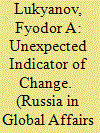

|
|
|
|
|
| Summary/Abstract |
The fighting in Ukraine has changed the coordinate system in world
politics, forcing all countries to take their position on the current events. The picture clearly shows the fundamental processes that are unfolding in the world.
|
|
|
|
|
|
|
|
|
|
|
|
|
|
|
|
| 14 |
ID:
189821


|
|
|
|
|
| Summary/Abstract |
The paper analyzes the current crisis in Russia’s relations with Western
countries and possible scenarios of further developments. The author
concludes that the West is essentially at war with Russia as the very concept
of war is not limited to a direct armed clash but suggests efforts by one
power to compel the opponent to fulfil this power’s will. The current crisis
was precipitated by the collapse of the Soviet Union, which heralded the
West’s victory in the Cold War. Russia was not included in the Western bloc
as a full-fledged member, and the West never intended to recognize Russia’s
right to become an independent great power. The great power status is
an objective necessity for Russia, but its potential does not allow it to
confront the collective West on equal terms. One possible solution is further
rapprochement with China which has the capability to claim the status of a
second superpower.
|
|
|
|
|
|
|
|
|
|
|
|
|
|
|
|
|
|
|
|
|